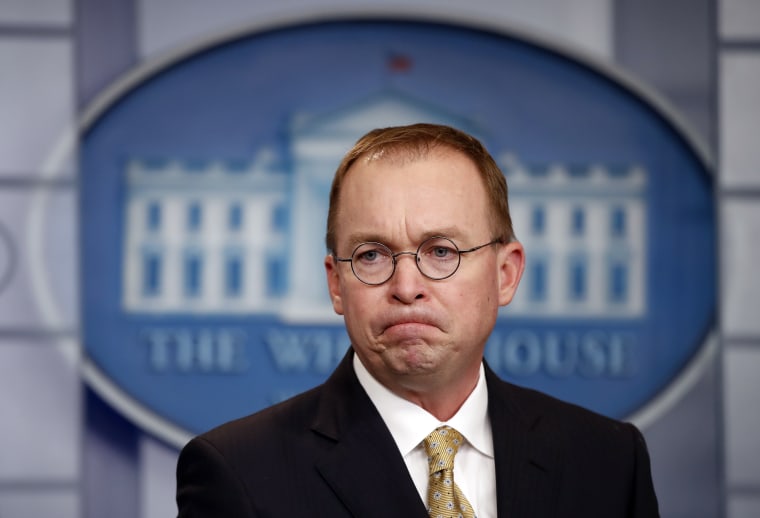It wasn't long ago that Republicans were hair-on-fire obsessed with the deficit and the nation's multi-trillion-dollar debt. Though the purpose of the Tea Party "movement" was always a bit murky, it was ostensibly about the right's overwhelming anxiety about the United States' fiscal imbalance. The irony of these Republicans' concerns went largely overlooked.
After all, as a percentage of the economy, Ronald Reagan was responsible for some of the largest deficits in American history. After the deficit disappeared entirely under Bill Clinton, George W. Bush added trillions to the debt.
It was in 2003 when then-Vice President Dick Cheney declared that "deficits don't matter."
After Barack Obama shaved a trillion dollars off the deficit in his first seven years, the deficit is soaring again under Donald Trump -- and Cheney's adage is back as a governing principle.
The president won office as the rare Republican to pledge not to touch Social Security or Medicare -- while still slashing taxes for top earners and for corporations. You don't need much math to know what that means for deficits. And not only that, but Democrats opposed to the administration barely make an issue of it. They have their own deficit-financed plans to expand access to education and health care that they want to pursue.The State of the Union, accordingly, did not mention the deficit situation, in either a positive or negative light. Indeed, Chief of Staff and budget chief Mick Mulvaney, who pretended very, very hard to care about the deficit as a congressman during the Obama years, told Republicans privately that "nobody cares" anymore.
It's largely true that "nobody cares" about the deficit, but Mulvaney's framing was incomplete. It's probably better to say, "The people who pretended to care no longer feel like maintaining the pretense."
Indeed, Mick Mulvaney is himself at the top of that list.
As regular readers may recall, in 2011, during the debt-ceiling crisis he helped create, Mulvaney said he'd rather see the United States default on its debts than pass a clean debt-ceiling hike. As the then-congressman put it at the time, Americans "desperately need ... structural change that stops Congress from continuing to spend a bunch of money we don't have."
He later told Politico that he got involved in politics in part because he disapproved of the Bush/Cheney administration's big budget deficits.
During Trump's transition period, he tapped the far-right South Carolinian to serve as his budget chief. "Right now, we are nearly $20 trillion in debt," the president-elect said in December 2016, "but Mick is a very high-energy leader with deep convictions for how to responsibly manage our nation's finances and save our country from drowning in red ink."
The national debt is now $22 trillion, and the person committed to "saving our country from drowning in red ink" has decided that "nobody cares" about the issue he claimed to take seriously.
For the record, I'm not a deficit hawk, and I'm sympathetic to the idea that "nobody cares" about the deficit. But looking ahead, the next time Democrats have power in D.C., is it safe to assume Republicans will start pretending to take the issue seriously again?
Can we all agree in advance that their rhetoric will deserve to be laughed at?
Update: Here's another relevant quote from Mulvaney, this time from 2011: "Anybody who is up to speed on budget issues should be scared to death by what's happening with the debt and the deficit in this country. If you're not losing sleep over it, then you're simply not paying attention."
By this reasoning, is Trump's budget chief not paying attention?
